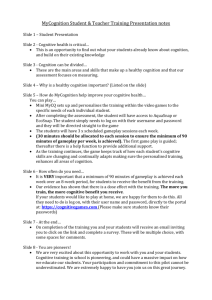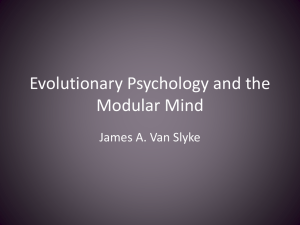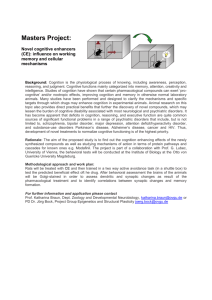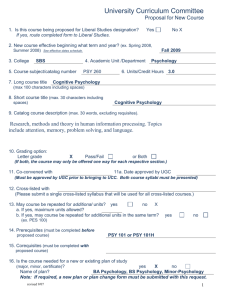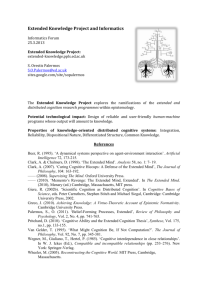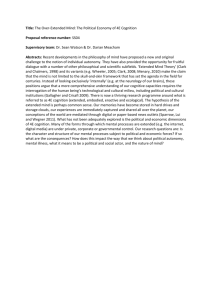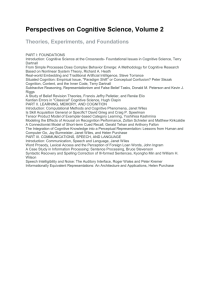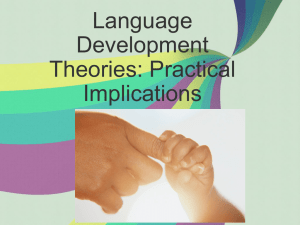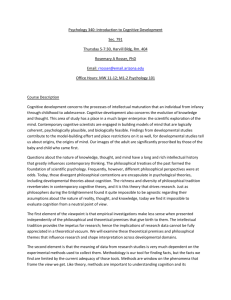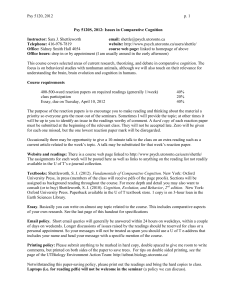Cognition - Chris Tromborg
advertisement
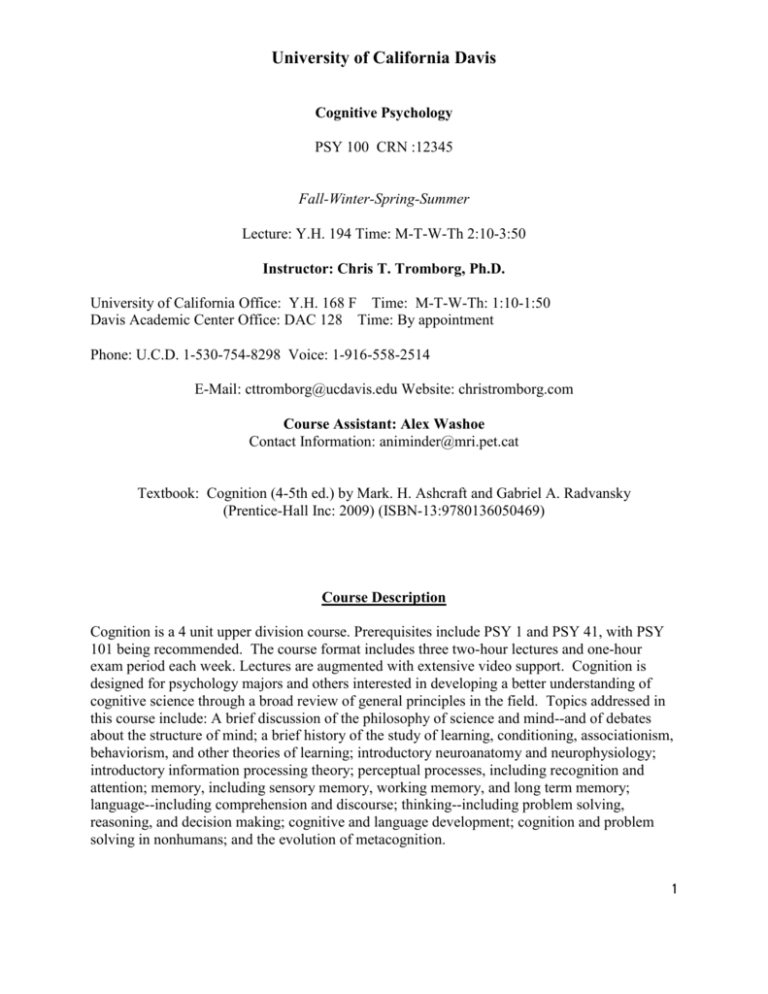
University of California Davis Cognitive Psychology PSY 100 CRN :12345 Fall-Winter-Spring-Summer Lecture: Y.H. 194 Time: M-T-W-Th 2:10-3:50 Instructor: Chris T. Tromborg, Ph.D. University of California Office: Y.H. 168 F Time: M-T-W-Th: 1:10-1:50 Davis Academic Center Office: DAC 128 Time: By appointment Phone: U.C.D. 1-530-754-8298 Voice: 1-916-558-2514 E-Mail: cttromborg@ucdavis.edu Website: christromborg.com Course Assistant: Alex Washoe Contact Information: animinder@mri.pet.cat Textbook: Cognition (4-5th ed.) by Mark. H. Ashcraft and Gabriel A. Radvansky (Prentice-Hall Inc: 2009) (ISBN-13:9780136050469) Course Description Cognition is a 4 unit upper division course. Prerequisites include PSY 1 and PSY 41, with PSY 101 being recommended. The course format includes three two-hour lectures and one-hour exam period each week. Lectures are augmented with extensive video support. Cognition is designed for psychology majors and others interested in developing a better understanding of cognitive science through a broad review of general principles in the field. Topics addressed in this course include: A brief discussion of the philosophy of science and mind--and of debates about the structure of mind; a brief history of the study of learning, conditioning, associationism, behaviorism, and other theories of learning; introductory neuroanatomy and neurophysiology; introductory information processing theory; perceptual processes, including recognition and attention; memory, including sensory memory, working memory, and long term memory; language--including comprehension and discourse; thinking--including problem solving, reasoning, and decision making; cognitive and language development; cognition and problem solving in nonhumans; and the evolution of metacognition. 1 This course is designed to foster a better appreciation for cognition in humans (and even a few other species) by emphasizing a comparative approach to the study of learning, memory, and problem solving. Information generated through research employing different theoretical perspectives will be presented in class for discussion, a process in which students are encouraged to participate. Upon completion of this course students should be able to: >Articulate how the scientific method is used to investigate the relationships between the nervous system and cognition. >Differentiate between the various techniques and approaches employed by scientists in various areas of cognitive science. >Employ critical thinking skills to assess the merits of claims made by proponents and opponents of cognitive psychology research presented in the popular press. >Explain individual variation in patterns of perception. >Demonstrate an understanding of the concepts of learning, memory, thinking, and language. >Analyze and describe some of the current theories used to describe the complexity of human thought processes. >Compare human cognition with implied cognition in non-human species and describe the methods used to demonstrate species similarities and differences. >Recognize some of the shortcomings of traditional methods of memorization and differentiate between and describe alternate, more effective strategies for improving learning and memory. >Demonstrate an understanding of language development and its influence on the structure of thought, including the role of bilingualism in effective education. >Connect the role of neurological structures and psychological disorders to related cognitive processes. >Develop strategies for using your knowledge of cognition to improve the effectiveness of education outside of the classroom. Evaluation Procedures Students are evaluated on the basis of their performance on exams, participation in class discussion, and attendance. Students may earn up to a maximum of 200 points in this course. Grading is strictly proportional: Grades are never curved. 2 There will be five equally weighted 50 point exams. Exams consist exclusively of objective test items (multiple choice: Scantron #UCD-2000). The student's lowest exam score from the second, third, or fourth exam will be disregarded when the final grades are calculated. The fifth exam is not cumulative. Students are allowed up to 60 minutes to complete each exam. Exams absolutely must be taken when scheduled and can only be rescheduled for compelling reasons authorized by your instructor. Remember: Students are evaluated on the basis of their performance on exams, extra credit, participation in class discussion, and attendance. Attendance is important: Those regularly absent will see this reflected in their grades. Responsibilities and Suggestions for Success General Principles of Psychology (PSY 1) and Research Methods (PSY 41) are prerequisites for this course. Introduction to Psychobiology (PSY 101) would provide students with an extremely useful background for cognition. Attendance is important. You are encouraged to attend class: Students who do not attend lecture during the first two weeks will be dropped from the course. Thereafter, students missing more than nine hours of lecture may be dropped from the class. It is your responsibility to officially obtain a withdrawal from this course. Failure to do so may result an F grade. Please attempt to arrive to class on time and plan to remain for the duration of the lecture to minimize disrupting others. Students should not engage in conversations unrelated to course materials during lectures. Students are encouraged to remain current in the readings in order to facilitate discussion in class. Prepared students are able to offer informed questions that can clarify points of confusion for themselves and frequently for their classmates. You are expected to bring course related materials to class and to participate in class discussion. Failure to participate will be reflected in your performance on exams and in your final grade. Outside of class, students should attempt to work together on course materials. Students must take exams when they are scheduled. A student missing an exam will receive zero points and this score will be treated as their low midterm score, which is not entered into the calculation of the final grades. Students missing two or more exams will automatically be dropped from the class. 3 Students must arrive within fifteen minutes of the beginning of the exam, after which the exam is closed: You have up to 60 minutes to complete exams. Cheating on exams will be rewarded with a grade of F and subsequent disciplinary actions from Student Judicial Affairs. Students with learning or other disabilities should speak to the instructor, who will place them in contact with the Disability Resource Center or the Learning Resource Center. Please deactivate all casual communications devices within the classroom. Grading Scale There is no+- grading. 200-180=A 179-160=B 159-140=C 139-120=D 119 and below=F Tentative Course Schedule The term begins at the beginning of the quarter and Concludes at the end of the quarter. The final exam will be administered on the final day of the quarter. July 4, is a national holiday. We reserve the right to modify this schedule as the term proceeds Week One: Introduction to the course and your textbook Cognitive Psychology: An Introduction Chapter One History and Systems Biology and Behavior Basic Neuroscience Neurons and Neural Impulses Neural Networks Nature Versus Nurture A History of Learning Learning's Theorists and Theories Learning and Intelligence in Non-human Animals The Cognitive Science Approach Chapter Two 4 Week Two: Exam One Sensation, Perception, and Pattern Recognition Chapter Three The Anatomy and Physiology of Vision and Audition Attention Chapter Four Higher-order Perceptual Processing Week Three: Exam Two Short-Term Working Memory Chapter Five The Hippocampus and the DLPFc Learning and Remembering Chapter Six Neural Networks and Connectionism Knowing Chapter Seven Week Four: Exam Three Using Knowledge in the Real World Chapter Eight Interactions in Long-Term Memory Language Chapter Nine Language Research in Nonhuman Primates: Can Chimps Talk? Comprehension: Written and Spoken Language Chapter Ten Week Five: Exam Four Cognitive and Language Development Language Comprehension in Nonhuman Animals? Comparative Cognition: Reasoning & Problem Solving in Non-human animals 5 Week Six: Thinking Decisions , Judgments, and Reasoning Chapter Eleven Problem Solving Chapter Twelve Trends in Contemporary Cognitive Neuroscience Course retrospective and Review Week Six: Exam Five -We reserve the right to alter schedules as the course proceedsBelief in myths allows the comfort of opinion without the discomfort of thought www.myucdavis.edu wwwchristromborg.com 6
